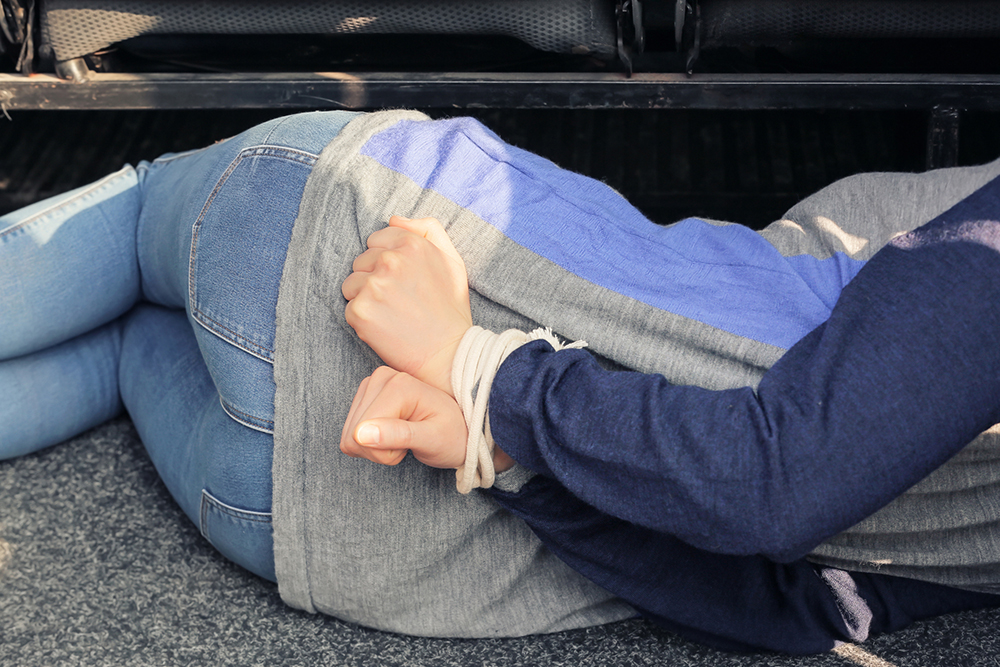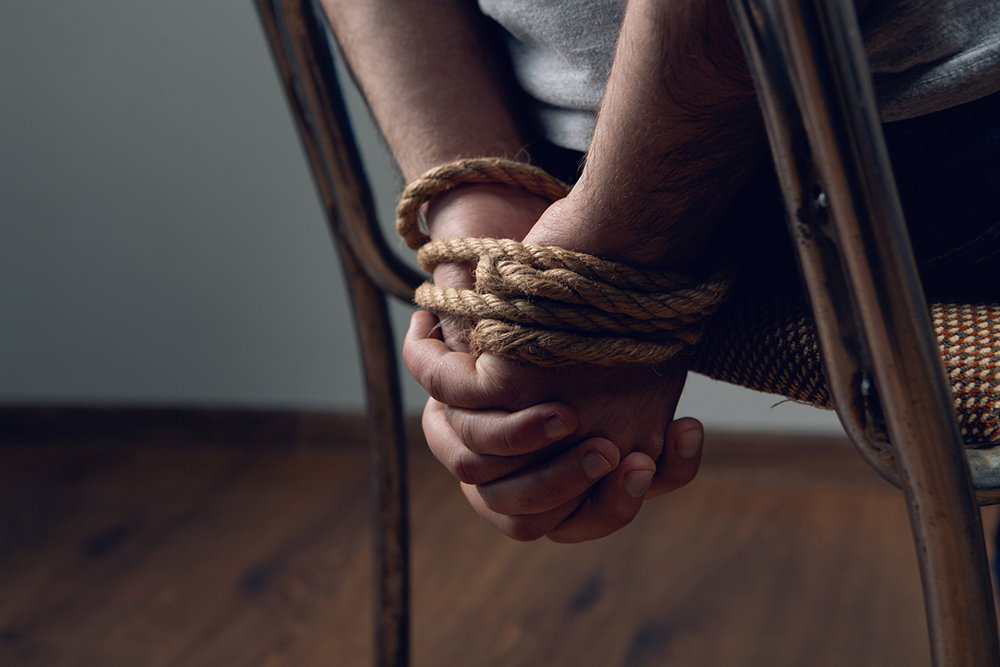Kidnapping Lawyer in Toronto
Kidnapping is typically defined as seizing and taking a person against their will. What makes kidnapping different from false imprisonment or unlawful confinement, is that kidnapping involves moving the person to a secondary location. This makes it a more serious offence under the eyes of the law because it reduces the chances of rescue.
Kidnapping is strictly an indictable offence – meaning it is the most serious kind of offence under Canadian law.
Kidnapping is categorized as a continuing offence, meaning continues until the person is no longer unlawfully confined.
Being charged with kidnapping can be an incredibly distressing situation. It can have negative consequences for one’s professional and personal life. The maximum penalty for kidnapping under Canadian law is life in prison. There are also mandatory minimum sentences for kidnapping charges, for example, if a firearm is used during the offence, the Criminal Code of Canada imposes a minimum of five years in prison.
The charge of kidnapping is set out in Section 279 of the Criminal Code, as listed below:
Key Takeaways
- Kidnapping is an indictable offence, which is the most serious offence under Canadian law
- The maximum potential punishment for kidnapping is life in prison
- If you’re granted bail, there may be conditions imposed on your release, such as:
- Avoiding interaction with the alleged victim.
- Stopping all communication (direct or indirect) with the other person.
- Maintaining a physical distance from the other person’s home, workplace, place of worship etc.
- Giving up possession of all weapons (ex. Firearms or knives).
- Abstaining from alcohol and non-prescription drugs.
- Abiding by a curfew
- Provide your current address to the court and notify the court of any address changes.
- There are various factors that may impact your bail conditions, such as:
- Suspected criminal activity
- Probability of appearing in court
- Previous criminal record
- Past drug and alcohol use
- Physical health
- Mental health status
- Employment status
- Housing situation
- Reputation in the community
- Even though kidnapping cases can be technical and complex, they can be successfully defended with the help of a skilled and experienced lawyer
How Can a Kidnapping Lawyer in Toronto Help?
Hiring a criminal defence lawyer in Toronto can greatly benefit anyone facing kidnapping charges.
A criminal defence lawyer can provide important pre-charge legal advice, ensuring that you understand your rights and avoid actions that could harm your case. They can offer protection from self-incrimination by guiding you on how to interact with law enforcement.
A skilled lawyer is adept in gathering evidence, interviewing witnesses, and retaining expert witnesses to build a strong defense.
Further, a lawyer navigates the complexities of the criminal justice system and court processes, providing strong representation during trial. This comprehensive support enhances the chances of a favorable outcome, which is why it is important to turn to criminal defence lawyer for help when facing a kidnapping charge.
Examples of Kidnapping Charges
Here are some common examples of kidnapping and unlawful confinement:
- Holding someone against their will in a location
- Not letting someone leave a certain location (like a car or a house)
- Forcing someone to go somewhere by threatening them with a weapon
- Holding someone against their will for a ransom amount

What are the consequences of a kidnapping charge?
The consequences for kidnapping can vary based on the circumstances of your case. As mentioned above, kidnapping is always an indictable offence, meaning it is a more serious crime that has more serious penalties.
The maximum penalty for kidnapping is life in prison. There are also mandatory minimum sentences, meaning that if certain actions are carried out, the judge is required to sentence you to a certain sentence.
For example, if a firearm is used in the kidnapping, the minimum sentence is four years.
For a first offence involving the use of a firearm and the kidnapping has connections to a criminal organization, there is a minimum sentence of five years. This increases to seven years for subsequent offences, where a firearm is used, and the kidnapping is connected to a criminal organization.
When the victim is under the age of 16, the minimum sentence is five years, unless the offender is a parent or guardian.
Aside from mandatory minimum sentences, the court can also assign another sentence, where multiple factors regarding the kidnapping will be assessed to determine its length.
Defences to Kidnapping Charges
There are many defences that may be used against a kidnapping charge. The best defence will be dependent on the specific circumstances of each case.
While the Crown has to prove the elements of the offence beyond a reasonable doubt, you may need to raise certain defenses at trial. There are many strong defences our skilled lawyers can use to help battle the charges you’re facing.
Generally, some of the most effective defences against kidnapping charges are:
- Factual Innocence: This is when the facts and evidence do not support your involvement in the offence and is usually the strongest defence. This might involve challenging the identification process. For instance, you could have been identified as the perpetrator, mistakenly. To use this defence effectively, you will likely have to show evidence, like providing some sort of alibi to prove that you weren’t at the location of the crime when it was committed.
- Lack of Mens Rea: To convict you of kidnapping, the Crown has to prove you intended to confine or imprison the alleged victim, send them out of the country, or hold them for ransom or service. If there is reasonable doubt about your intent to do those things, it will weaken the Crown’s case against you.
- Mistaken Belief of Consent: If you genuinely (but mistakenly) believed the alleged victim consented to being moved, this can challenge the Crown’s case and potentially lead to a full defence.
- Violation of Constitutional Rights: The Canadian Charter of Rights and Freedoms states what your rights are before and after your arrest. If the police violated these rights, it could strengthen your defence.
Kidnapping Charge Investigation
There is no 24-hour wait period to report someone missing Ontario, so reports of missing persons to the Toronto Police Service are treated as investigations right away.
The case will stay open until the police verify the missing person’s location and identity. The person reporting will be required to provide a full description of the missing person, which includes the last known time, date, and location they were seen at. The police will also gather information regarding their physical appearance, health, and emotional state. A photograph will likely also be requested, although it may not always be shared.
Some additional information may also we gathered to help the investigation. This could potentially include email addresses, social media accounts, phone numbers, the make and type of phones, carrier/service providers, driver’s licence, passport location, credit card and banking information, contacts of significant people like friends or family, and places frequented.
If the missing person is located by the police, and they believe that you are the perpetrator, you will be arrested at the scene. If you are not present on scene, the police will issue a warrant for your arrest or attempt to track you down.
After you are charged, the police will create a “disclosure package” of all the collected evidence and give it to the Crown Prosecutor. You have the right to see this package and review the evidence against you. Our lawyers will assist you in acquiring and reviewing the disclosure package to examine the Crown’s case and identify potential legal defenses.

Bail Conditions for Kidnapping Charge
You will likely be kept in police custody if you are charged with kidnapping. You will need to have a formal bail hearing to be released until your trial takes place.
The bail hearing must be held within 24 hours, and this period starts from the time you are arrested or detained, not the time you are brought to a courthouse or district office.
If you are granted bail, there may be certain conditions placed on your release. Conditions will vary on a case-by-case basis but could include avoiding any interaction with the alleged victim and abstaining from all direct/indirect communication with them. You may also be required to stay away from the alleged victim’s home, workplace, school, place of worship, and other frequented locations.
You may be required to surrender all weapons and firearms, including permits. Further, you may be asked to refrain from alcohol and non-prescription drugs, abide by a curfew, display law-abiding behaviour, and give the court your current address and notify them of any address changes.
There’s many factors that could impact what your bail conditions are, such as your likelihood to appear in court, suspected criminal activity, previous criminal record, past drug and alcohol use, physical and mental health statuses, employment status, housing situation, and reputation in the community.
Frequently Asked Questions About Kidnapping
Will a kidnapping charge show up on my criminal record?
A kidnapping charge will not show up on your criminal record if the case is ongoing or open. However, police databases may show that you have been charged with an offence. A criminal record, however, will only show up if you’ve been convicted of a crime. Even conditional and absolute discharges will not result in a criminal record, as they’re not considered criminal convictions.
Can I travel while a kidnapping case is ongoing?
During an ongoing kidnapping case, if you have been granted bail, the conditions of your bail could limit you from travelling outside of Canada, or even Ontario. It is important to be aware of your bail conditions, so you do not violate them.
Can I go to jail for kidnapping charges?
Yes, it is possible that you may face imprisonment if found guilty of kidnapping. The maximum sentence for this offence is life imprisonment. However, your sentence will be dependent on the individual factors in your case.




